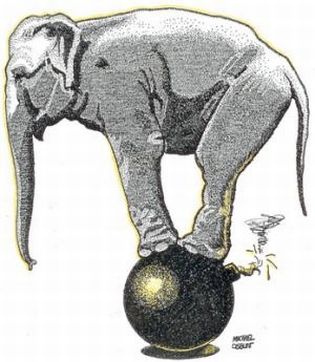...
 |
Let's not argue about who
wrecked the economy |
The core message of the Romney campaign is comprised of two related premises. The first acknowledges that President Obama, upon his inauguration in 2009, inherited a very bad economic condition, but takes the position that he has had nearly four years to 'fix' it and has failed. The second, often less explicitly stated but every bit as important to the campaign's messaging, is that given the same set of economic and political conditions, a Mitt Romney Presidency would be able to relatively quickly turn things around.
In order to think about this election in economic terms, which we are reliably informed is the primary basis for determining the winner of every national election, we need to evaluate these two premises to see if they can hold up to scrutiny. Because, to be frank, the labor market, housing market and economic opportunity in America are in a horrible state, and the status quo is doing serious damage to the future prospects of millions of Americans, not to mention the future economic growth and well being of the nation itself. So if it is true, or at least reasonable to believe that a Romney presidency can change these conditions, improving the economy and reducing the unemployment rate, one would have to at least consider voting for him on this basis alone.
It's hard to argue with the first premise. Obama certainly did inherit a disastrous economy, and it is impossible to argue that he has done a sterling job, or even everything he could, to improve it. There is no doubt that he was stymied on the legislative side by a cynical and partisan political opposition, one that never accepted the legitimacy of the Democratic President and were more than willing to sacrifice the best interests of the nation and their constituency to create the worst possible conditions for Obama's re-election. But in so many moves, from his pivot from economic growth to deficit reduction, his retention of Ben Bernacke as Chairman of the Federal Reserve to his management of the Debt Ceiling crisis, Obama has chosen politics over policy, and has avoided the kind of confrontation that might win policy fights at the expense of political popularity. He has continuously tried to walk a middle path, attempting to incorporate even the most ludicrous "ideas" from the Republican side, seeking bipartisan support for policies that required those policies to be made useless or even counterproductive, even as all along they painted him as a socialist enemy of the country he leads. There are those who at least
want to believe that a second Obama term would be free of these political constraints, allowing him to lead more aggressively, but just as there was no indication before the election that he was anything but a center-right technocrat with powerful populist instincts, there is no indication that he would govern in a significantly different manner in his second term.
It is the second premise of the Romney campaign that bears more scrutiny than it has been getting. Is there any basis for believing that he could (and would) take measures that would actually improve the economic conditions for America's citizens? Oddly, because his party has rejected wholesale the longstanding concept of Keynesian stimulus and continue to embrace a more Freshwater, hard-money, supply side macroeconomic model, much of his economic plan would function as at least an indirect Keynesian stimulus. There is no doubt that the massive deficit-funded tax cuts, particularly for the wealthy, that he would push to implement immediately would be economically stimulative. Of course, tax cuts for the wealthy are the
least effective Keynesian option, but would fall into that category nonetheless. But in general, to the extent his policy goals would be implemented, it's hard to believe that they would not serve to take a tremendous amount of money, jobs and demand out of the economy, strangling growth in the process. With the reduction of social safety net spending, government employment at the federal, state and local level and massive reduction in government revenues that could be applied to infrastructure, research and aid to states, it seems very likely that Romney's economic plan might well lead directly to another recession.
So in the end, while Romney is correct and to evaluate Obama on the merits of his ability to improve American economic conditions, it also appears that a Romney presidency would make them significantly worse, which in a two-party system is an unfortunate endorsement of the status quo. But probably the most important thing to remember in any Presidential campaign season is the highly limited power of the Chief Executive in American governance. Without legislation, there is very little in the way of domestic policy that the President can implement. As the de facto leader of his party, he can help shape the legislative agenda, but passing a bill still requires (at least) a congressional majority. Of course, this is less true in foreign affairs and judicial appointments, so one must not understate the actual power of the American Presidency, but in economic matters he will remain at the mercy of the Congress and the Fed.
...









